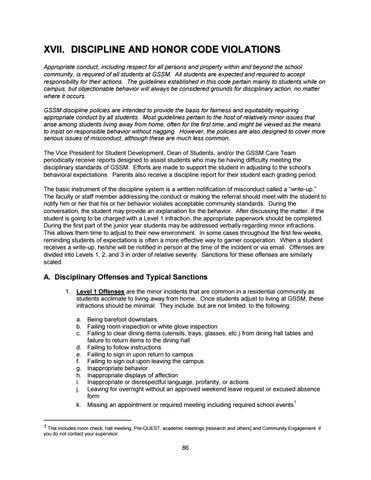XVII. DISCIPLINE AND HONOR CODE VIOLATIONS Appropriate conduct, including respect for all persons and property within and beyond the school community, is required of all students at GSSM. All students are expected and required to accept responsibility for their actions. The guidelines established in this code pertain mainly to students while on campus, but objectionable behavior will always be considered grounds for disciplinary action, no matter where it occurs. GSSM discipline policies are intended to provide the basis for fairness and equitability requiring appropriate conduct by all students. Most guidelines pertain to the host of relatively minor issues that arise among students living away from home, often for the first time, and might be viewed as the means to insist on responsible behavior without nagging. However, the policies are also designed to cover more serious issues of misconduct, although these are much less common. The Vice President for Student Development, Dean of Students, and/or the GSSM Care Team periodically receive reports designed to assist students who may be having difficulty meeting the disciplinary standards of GSSM. Efforts are made to support the student in adjusting to the school’s behavioral expectations. Parents also receive a discipline report for their student each grading period. The basic instrument of the discipline system is a written notification of misconduct called a “write-up.” The faculty or staff member addressing the conduct or making the referral should meet with the student to notify him or her that his or her behavior violates acceptable community standards. During the conversation, the student may provide an explanation for the behavior. After discussing the matter, if the student is going to be charged with a Level 1 infraction, the appropriate paperwork should be completed. During the first part of the junior year students may be addressed verbally regarding minor infractions. This allows them time to adjust to their new environment. In some cases throughout the first few weeks, reminding students of expectations is often a more effective way to garner cooperation. When a student receives a write-up, he/she will be notified in person at the time of the incident or via email. Offenses are divided into Levels 1, 2, and 3 in order of relative severity. Sanctions for these offenses are similarly scaled.
A. Disciplinary Offenses and Typical Sanctions 1. Level 1 Offenses are the minor incidents that are common in a residential community as students acclimate to living away from home. Once students adjust to living at GSSM, these infractions should be minimal. They include, but are not limited, to the following: a. Being barefoot downstairs b. Failing room inspection or white glove inspection c. Failing to clear dining items (utensils, trays, glasses, etc.) from dining hall tables and failure to return items to the dining hall d. Failing to follow instructions e. Failing to sign in upon return to campus f. Failing to sign out upon leaving the campus g. Inappropriate behavior h. Inappropriate displays of affection i. Inappropriate or disrespectful language, profanity, or actions j. Leaving for overnight without an approved weekend leave request or excused absence form 1 k. Missing an appointment or required meeting including required school events
1 This includes room check, hall meeting, Pre-QUEST, academic meetings [research and others] and Community Engagement if you do not contact your supervisor.
86


